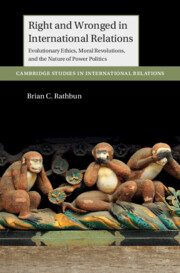 Right and Wronged in International Relations
Right and Wronged in International Relations The Material Origins of Ethics
Published online by Cambridge University Press: 29 July 2023
Evolutionary psychologists have long maintained that humans’ moral sense is essential to their success as a species and part of what makes humans unique among animals. Moral systems have functional roots, helping individual organisms survive, thrive, and pass on their genetic material. It is not despite anarchy but because of anarchy that humans have an ethical sense. Evolutionary theorists identify moral condemnation and binding morality as crucial for the emergence of other-regarding, altruistic behavior that makes liberal morality possible in the first place. When others harm us, or even third parties, we condemn, passing moral judgments and sometimes retaliating; we do not speak evil but speak of evil. Moral condemnation encouraged the development of moral conscience to avoid the outrage of, and often violent group punishment by, those who were wronged. This internalized sense of right and wrong in turn acted as a credible signal of cooperativeness that unwittingly and unconsciously paid material dividends. Group favoritism, also thought to have evolutionary origins, is moral in nature as well. Those early humans who felt obligated to contribute to the collective defense against common threats in an extremely dangerous environment could prosper enough to offset the competing incentives to free-ride within the group.
To save this book to your Kindle, first ensure no-reply@cambridge.org is added to your Approved Personal Document E-mail List under your Personal Document Settings on the Manage Your Content and Devices page of your Amazon account. Then enter the ‘name’ part of your Kindle email address below. Find out more about saving to your Kindle.
Note you can select to save to either the @free.kindle.com or @kindle.com variations. ‘@free.kindle.com’ emails are free but can only be saved to your device when it is connected to wi-fi. ‘@kindle.com’ emails can be delivered even when you are not connected to wi-fi, but note that service fees apply.
Find out more about the Kindle Personal Document Service.
To save content items to your account, please confirm that you agree to abide by our usage policies. If this is the first time you use this feature, you will be asked to authorise Cambridge Core to connect with your account. Find out more about saving content to Dropbox.
To save content items to your account, please confirm that you agree to abide by our usage policies. If this is the first time you use this feature, you will be asked to authorise Cambridge Core to connect with your account. Find out more about saving content to Google Drive.